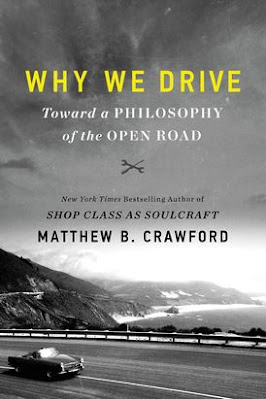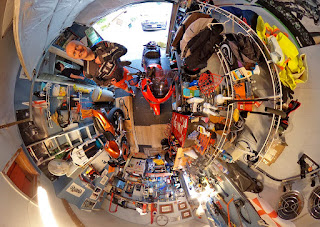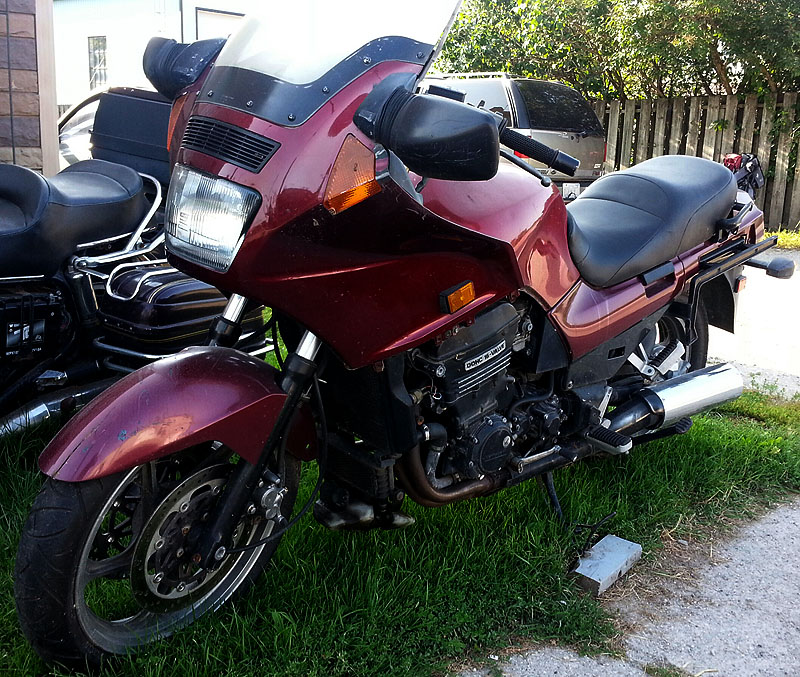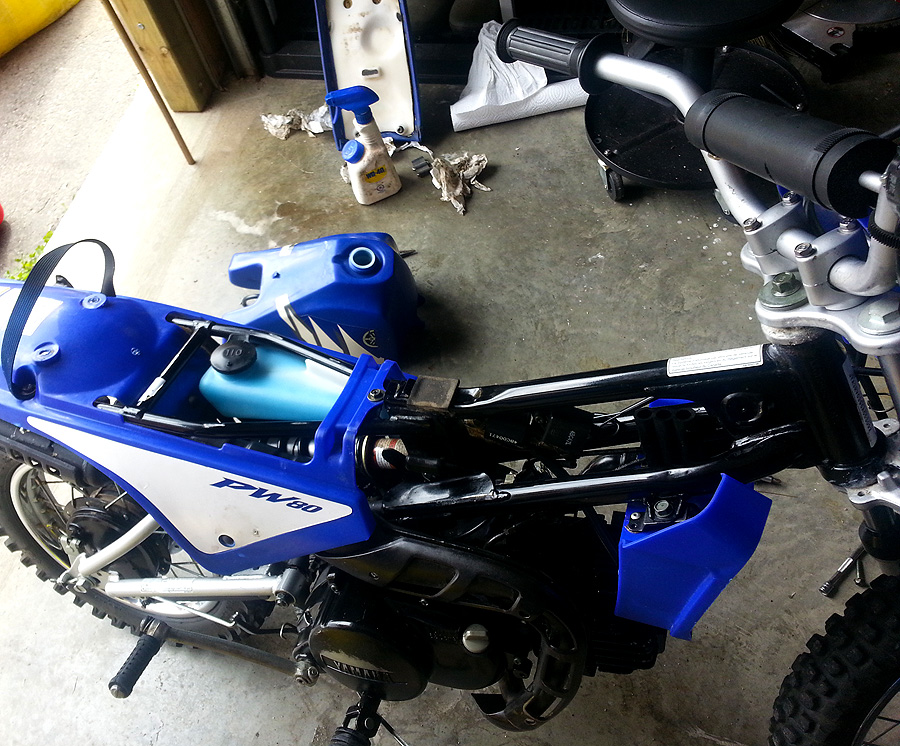As I sit here I’m in the middle of a twelve hour odyssey to get back to Canada from the UK. From this cramped seat where I’m constantly being jostled by people, babies burst into full throated song and planes sit on tarmac for forty minutes waiting to unload luggage from two people who checked in then didn’t board, I’m reminded of how much I fucking hate flying. My sinuses are in a vice and I spent ten of the short 90 minutes we had on the ground in Reykjavik trying to clear them of blood and mucus.
At 6’3” and 17 stone, I’m not built for air travel. These seats were designed for people half my size and the leg room varies from barely sufficient to chronically painful. The only reason I’d subject myself to this hell is to visit somewhere spectacular like Iceland or go home to England for a few short weeks to make any kind of connection with my family and memories from childhood.
It has been over a month since I’ve ridden the Tiger with its infinite headroom, divine wind and singular sense of freedom. The freedom of riding a motorcycle has never felt so far away as it does when you’re human cattle on an airliner.
As a younger man I studied flight and once dreamed of doing it myself, but and older post sinus surgery me finds the pressure changes painful and the increasingly OCD/socially anxious me would rather be walking across the Sahara than sitting on this aeroplane right now. There is no kind of tired like the kind of tired you get from the pressure changes and dehydration of flying. The resting 150 heart rate from the social anxiety is a nice bonus.
 I love to travel. Going to new places and seeing all the different ways the world can be beautiful is one of my favourite things, but the emotional cost of doing it this way is extreme. The difference between going somewhere on a motorbike and going somewhere in a plane is like the difference between creating a piece of art and looking at a picture online. One is Travel with a capital T, the other is utilitarian transportation.
I love to travel. Going to new places and seeing all the different ways the world can be beautiful is one of my favourite things, but the emotional cost of doing it this way is extreme. The difference between going somewhere on a motorbike and going somewhere in a plane is like the difference between creating a piece of art and looking at a picture online. One is Travel with a capital T, the other is utilitarian transportation.

We did nine days and covered over two thousand kilometres in some truly beaten up rental cars in Iceland, and the country begs for another go. It’s a beautiful, expensive, unique place that makes you feel like you’re on the edge of the world. Iceland wasn’t born yet when the Canadian Shield I live on was already ancient. That newness comes through around every corner, and it’s blessedly free of people. The ones you do meet are happy to see you (because seeing you is a rarity) and their sense of humour is so honest and piercing that it’s practically glacial in its purity. If you can afford it, there isn’t much to dislike about Iceland though more than a night in Reykjavik is enough though – head out of the capital for the real thing. If you want a less touristy city, Akureyri on the north coast is a lovely alternative.
We wandered Iceland in a rental hatchback that looked like it had fought a ground battle

in Afghanistan and then a diesel minivan with no springs left and almost a hundred thousand kilometres on the clock. They did the job, but they did it with no joy. When I returned the black and blue Vauxhall Corsa to the impossible to find rental agency (they are called Flizzr, but you have to go to SixT to get it and they don’t say they’re Flizzr anywhere), it was with minutes to spare. I came screaming in from miles of lava fields in a never ending dusk with whisps of smoke streaming off the car, drove it into the side of the building where it burst into flames, mic-dropped the keys at the feet of the stunned attendant and skipped off into the never-to-happen darkness – at least that’s how I remember it. The car had over 80 known dents and scratches on it (life is tough in the land of fire and ice), yet the attendant still went over it with a floor mirror on a stick and took ten minutes to OK it so I could go. Whatever.
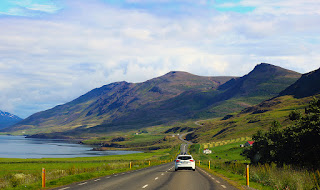
The best car I’ve ever driven was a 9/10. The worst car I’ve ever driven was a 1/10. It got a 1 because it actually moved. I’ve sat in zeroes. This Corsa was a 3/10 car because it didn’t strand us anywhere, but the car pulled constantly and sounded like an asthmatic runner. I’ve seldom driven a car so beaten and tired and so minimally engineered in the first place as to make driving it so tiresome… and don’t rent with Flizzr, it’s a headache.
 The worst bike I’ve ever ridden was a 9/10 (bikes go up to 15/10, though I suspect an H2 is a 17/10).
The worst bike I’ve ever ridden was a 9/10 (bikes go up to 15/10, though I suspect an H2 is a 17/10).
The next day we picked up the diesel Citroen C4 Picasso – a six passenger minivan that was supposed to carry 3 adults, 3 teens and all their luggage for a week. Somehow it managed it, which says great things about Citroen’s ability to package a people carrier. It had three times the mileage of the poor, old, beaten Corsa but looked five years newer which says great things about Citroen’s ability to produce a tough vehicle. Other than the shock-less suspension that wallowed over bumps, the C4 was useful, but never enjoyable. It pulled well enough with all that weight, and got impressive gas mileage; it was the best vehicle on this trip, 7 out of 10. Who rents vans with blown suspension, a broken windshield and almost 100k on them? Icelandic car rental agencies, that’s who.
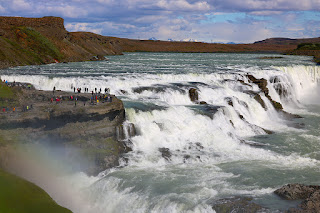
We drifted out of Iceland on a bus, which was easy enough, only to get stranded at the airport for five hours because Air Canada can’t be bothered to change the tires on their planes often enough. An Air Canada Jazz flight out of Gatwick, where we were headed, blew a tire on take off. A close scan of the runway showed nothing. Even when we don’t take Air Canada they manage to delay us.
We touched down near London at about 1am only to walk into a massive line at customs. The five hour closure had created a huge backlog, but rather than prepare for the backlog the UK had its customs agents sit there all day doing nothing and then left the night time skeleton crew unsupported. We got a bit lucky and only had a 45 minute wait in line, but the planes coming in behind us filled the massive waiting room with snaking lines. It must have been hours before the backlog was cleared by that exhausted night shift.
We were car-less for nearly a week and made do with commuter trains and the tube in and around London. We finally made our way up to Norfolk on British Rail First Class. It only cost a few pounds more to upgrade and it was the nicest single public transport experience of the trip. Comfortable seats, a quiet, modern train, complimentary tea and big windows were a joy. That the drooling masses weren’t on that car was also nice. Our seatmate was a transport engineer on his way back from interviewing a job prospect in London. We arrived in Norwich feeling ready for the next leg. I still love trains, I’m not sure why.
My cousin’s car (another ancient Corsa in similar shape to the one in Iceland, but 100%
less expensive) got us all over Norfolk. It took a few days for us to acclimatize to no shoulders (ever), roads that often disappeared into a driveway sized single lane and drivers who seemed almost psychotically intent on over driving every blind corner. We were told later that as we drove away from Norfolk things would get more sane, and they did. You have to treat driving in Norfolk like lion taming – show no weakness, never break eye contact and establish dominance immediately. Any sign of weakness is seen as an opportunity to try and kill you. We learned the term ‘normal for Norfolk’ and in fifteen days of living there came to appreciate the intensity of their driving culture. Doing it in an old teal Corsa with Norwich City Football Club stickers on it made us look a bit less touristy. By the end of two weeks we could blend.
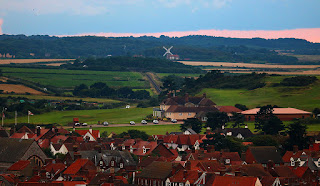
We cabbed it over to Enterprise Rental Car in Norwich for the next leg. We were getting a Skoda something or other mid-sized (compact in Canada), but it turned into a diesel Toyota Avensis station wagon (estate in the UK). This car was relatively new (12k miles on the odo), with massive, fancy alloy rims and a powerband about an inch wide. It pulled like a V6 from idle, but if you went over two thousand RPM it would start to wheeze, and by 2500rpm it was like accelerating in reverse.
It had a six speed manual transmission and I couldn’t imagine a car that needed that less.
One of the most perverse things about UK driving is that for a people doomed to sit in traffic most of the time, they are all determined to drive a manual transmission. I love manuals, but there is a time and a place, and a big diesel station wagon isn’t that time or place. The Toyota felt under-powered and guzzled diesel. Conservatively I’d guess that the Citroen with six people and their luggage got at least 40% better mileage than the newer Toyota that would turn off if left in neutral and stopped at a light – which caused quite a panic the first time it happened. That the Citroen managed to feel more lively with an automatic transmission, twice as many people and over four times the miles on it doesn’t say great things about Toyota’s state of the art when it comes to diesel motoring, but that wasn’t the worst part of the car.
I’m a sceptic of integrated sat-nav/GPS systems in cars. I understand how Google Maps and apps like Wazer crowdsource information and generate their map data, but the corporate systems built into cars have always seemed like half-assed, cheaper attempts at doing the same thing. They steer me wrong often enough that I usually take their directions as a suggestion at best. Toyota’s 2017 model GPS/sat-nav was the most half assed I’ve ever seen. A number of times in Dartmoor park we were led onto roads that were more an idea of a road than a passable thing, but it really let us down on our way to one of the biggest tourist attractions in the UK.
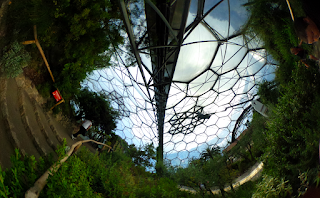
The Eden Project is a massive greenhouse science experiment in an abandoned quarry in Cornwall. As one of the largest tourist attractions in the country you’d think Toyota’s sat-nav could get us there. Instead of walking us in the front gate it turned us away into a town nearby and then directed us up a single lane track that almost had us damaging the rental car (with £1000 detectable) while we tried to avoid other lost new Toyotas and eventually do a 15 point turn to get back around and follow the phone instead. This kind of psychotic behaviour came up so often that I started questioning everything it suggested (“what are you talking about you psychotic bitch?”) We eventually retired the Toyota sat-nav (all we’d need according to the kid at Enterprise in Norwich) and used Wazer, which worked a treat on the heavily travelled roads of the UK.
Our last day with the car had us driving from Dartmoor in Devon to Epsom near London…
during the summer holidays. We spent nearly as much time sitting in traffic as we did trying to get the car back in time. That the on-board GPS kept wanting to drive us through the middle of towns during rush hour (it’s always rush hour in England) didn’t help.
After lining up to get in, lining up to park, lining up to pay, lining up to get into the castle and then lining up to leave again, we ended up with about 20 minutes at Corfe Castle. That’s what driving in the UK is like. You start on a trip and the GPS tells you you’ll get there at 5:00pm and you watch that slip away over the day until you’re frantically trying to navigate roundabout on top of roundabout in London suburb rush hour traffic ten minutes before they close and charge you for another day with the car. Our saving grace was my cousin leading us over there after we dropped off the luggage at his house – you’ll never get lost with a native guide. I’d give the Avensis station wagon a 4/10 – it’s more like a six or seven as it’s a big car that carries a lot and is smooth and modern, but that guzzling diesel and murderous GPS mean I wouldn’t even give it a pass.
The stress of driving at best meh rental cars in UK traffic meant I didn’t find the energy to go looking for my Morgan3 fix. Perhaps that would have reinvigorated my love of motoring after the diesel miasma.
Dartmoor is a driver’s playground with twisty medieval paths paved over and stunning countryside. As I watched everything from MG-As to E Types and a plethora of motorcycles ride the roads from behind the bars of my soulless diesel prison, I longed to be there, but wasn’t.
So here I am, writing this on a flight back to Toronto. The My Tiger has been sitting under a gentle accumulation of dust for weeks in the middle of the too-short Canadian motorcycle season. I can’t wait to go for a ride again, I just wish I could wormhole my way to Dartmoor to do it.
from Blogger http://ift.tt/2xaZzb7
via IFTTT












